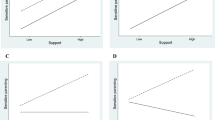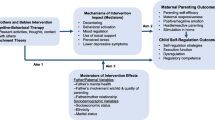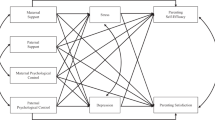Abstract
There is increasing recognition that young children’s self-regulation provides a foundation for overall wellness later in life. Yet, infants reared in poverty may exhibit less-developed self-regulation compared to their more economically-advantaged peers. Factors associated with poverty that may influence early self-regulation include maternal depression and parenting self-efficacy. However, few researchers have examined how both parenting self-efficacy and maternal depression may affect young children’s self-regulation. The purpose of this study was to investigate the associations among maternal depression, parenting self-efficacy, and infant self-regulation for a racially diverse sample of 142 mother–infant dyads living in low-income households in the United States. Maternal depressive symptomatology was determined with the Edinburgh Postnatal Depressive Scale. Parenting self-efficacy was determined with a self-report measure, reflecting caregivers’ mindset or feelings reflecting competency as a parent of an infant. Infant self-regulation was measured by parental report of the Infant Behavior Questionnaire Short Form Effortful Control subscale. While maternal depressive symptomatology and self-efficacy were directly and significantly correlated with infant self-regulation, results of a mediation model suggested that parenting self-efficacy mediated the relationship between maternal depressive symptomatology and infant self-regulation. Lower maternal depressive symptomatology predicted better parenting self-efficacy, in turn predicting better infant self-regulation. This study increases our understanding of how early factors shape the self-regulation of infants reared in low-income homes—highlighting the potential role of targeting parenting self-efficacy for parenting interventions for mothers experiencing depressive symptoms.
Highlights
-
We investigated infant self-regulation in low-income homes in the US.
-
Maternal self-efficacy mediated depression and infant self-regulation relation.
-
Lower maternal depression predicted better self-efficacy and better self-regulation.


Similar content being viewed by others
Data Availability
For this longitudinal study, data cleaning is still underway for later time points. However, data and code for the first three time points used in this study are clean can be made available by emailing the corresponding author.
References
Achenbach, T. M., McConaughy, S. H., & Howell, C. T. (1987). Child/adolescent behavioral and emotional problems: Implications of cross-informant correlations for situational specificity. Psychological Bulletin, 101, 213–222. https://doi.org/10.1037/0033-2909.101.2.213.
American College of Obstetricians and Gynecologists. (2018). Committee opinion no. 757: screening for perinatal depression. Obstetrics & Gynecology, 132(5), e208–e212. 1097/AOG.0000000000002927.
Atkins, R. (2010). Self-efficacy and the promotion of health for depressed single mothers. Mental Health in Family Medicine, 7, 155–168.
Baron, R. M., & Kenny, D. A. (1986). The moderator-mediator variable distinction in social psychological research: Conceptual, strategic, and statistical considerations. Journal of Personality and Social Psychology, 51, 1173–1182. https://doi.org/10.1037/0022-3514.51.6.1173.
Bates, J. E., & Bayles, K. (1984). Objective and subjective components in mothers’ perceptions of their children from age 6 months to 3 years. Merrill-Palmer Quarterly, 30, 111–130.
Bayley, N. (2006). Bayley scales of infant development-III. San Antonio, TX: The Psychological Corporation.
Beck, A. T. (1979). Cognitive therapy of depression. New York: Guilford Press.
Berger, A. (2011). Self-regulation: brain, cognition, and development. Washington, DC: American Psychological Association.
Blair, C., & Diamond, A. (2008). Biological processes in prevention and intervention: the promotion of self-regulation as a means of preventing school failure. Development and Psychopathology, 20(3), 899–911. https://doi.org/10.1017/S0954579408000436.
Bowlby, J. (1951). Maternal care and mental health. World Health Organization Monograph Series, Edn. 2, p. 179.
Carter, A. S., Garrity-Rokous, F. E., Chazan-Cohen, R., Little, C., & Briggs-Gowan, M. J. (2001). Maternal depression and comorbidity: predicting early parenting, attachment security, and toddler social-emotional problems and competencies. Journal of the American Academy of Child & Adolescent Psychiatry, 40, 18–26. https://doi.org/10.1097/00004583-200101000-00012.
Chaudron, L. H., Szilagyi, P. G., Tang, W., Anson, E., Talbot, N. L., Wadkins, H. I. M., & Wisner, K. L. (2010). Accuracy of depression screening tools for identifying postpartum depression among urban mothers. Pediatrics, 125, e609–e617. https://doi.org/10.1542/peds.2008-3261.
Chung, E. K., McCollum, K. F., Elo, I. T., Lee, H. J., & Culhane, J. F. (2004). Maternal depressive symptoms and infant health practices among low-income women. Pediatrics, 113, e523–e529. https://doi.org/10.1542/peds.113.6.e523.
Coleman, P. K., & Karraker, K. H. (2003). Maternal self-efficacy beliefs, competence in parenting, and toddlers’ behavior and developmental status. Infant Mental Health Journal, 24, 126–148. https://doi.org/10.1002/imhj.10048.
Cox, J. L., Holden, J. M., & Sagovsky, R. (1987). Detection of postnatal depression. Development of the 10-item Edinburgh Postnatal Depression Scale. British Journal of Psychiatry, 150, 782–786. https://doi.org/10.1192/bjp.150.6.782.
Davis-Kean, P. E. (2005). The influence of parent education and family income on child achievement: the indirect role of parental expectations and the home environment. Journal of Family Psychology, 19(2), 294–304. https://doi.org/10.1037/0893-3200.19.2.294.
de Tychey, C., Briancon, S., Lighezzolo, J., Spitz, E., Kabuth, B., de Luigi, V., & Vincent, S. (2008). Quality of life, postnatal depression and baby gender. Journal of Clinical Nursing, 17, 312–322. https://doi.org/10.1111/j.1365-2702.2006.01911.x.
Gartstein, M., Bridgett, D. J., & Low, C. M. (2012). Asking questions about temperament: self- and other-report measures across the lifespan. New York, NY: Guilford.
Gartstein, M. A., Putnam, S. P., & Rothbart, M. K. (2012). Etiology of preschool behavior problems: contributions of temperament attributes in early childhood. Infant Mental Health Journal, 33, 197–211. https://doi.org/10.1002/imhj.21312.
Gaynes, BN, Gavin, N, Meltzer-Brody, S, Lohr, KN, Swinson, T, Gartlehner, G, Miller, WC (2005). Perinatal depression: prevalence, screening accuracy, and screening outcomes (Evidence Report/Technology Assessment No. 119. https://www.ncbi.nlm.nih.gov/books/NBK37740/.
Gibson, J., McKenzie-McHarg, K., Shakespeare, J., Price, J., & Gray, R. (2009). A systematic review of studies validating the Edinburgh Postnatal Depression Scale in antepartum and postpartum women. Acta Psychiatrica Scandinavica, 119, 350–364. https://doi.org/10.1111/j.1600-0447.2009.01363.x.
Goodman, S. H., & Gotlib, I. H. (1999). Risk for psychopathology in the children of depressed mothers: a developmental model for understanding mechanisms of transmission. Psychological Review, 106, 458–490. https://doi.org/10.1037/0033-295X.106.3.458.
Granat, A., Gadassi, R., Gilboa-Schechtman, E., & Feldman, R. (2017). Maternal depression and anxiety, social synchrony, and infant regulation of negative and positive emotions. Emotion, 17, 11–27. https://doi.org/10.1037/emo0000204.
Hayes, A. F. (2013). Introduction to mediation, moderation, and conditional process analysis: a regression-based approach. New York, NY: Guilford Press.
Hayes, AF (2016). The PROCESS macro for SPSS and SAS [SPSS macro download and description]. http://www.processmacro.org/index.html.
Hayes, A. F., & Rockwood, N. J. (2017). Regression-based statistical mediation and moderation analysis in clinical research: observations, recommendations, and implementation. Behaviour Research and Therapy, 98, 39–57. https://doi.org/10.1016/j.brat.2016.11.001.
Hancock, K. J., Mitrou, F., Shipley, M., Lawrence, D., & Zubrick, S. R. (2013). A three generation study of the mental health relationships between grandparents, parents and children. BMC Psychiatry, 13, 299 https://doi.org/10.1186/1471-244X-13-299.
Hosseini-Kamkar, N, & Morton, JB (2014). Sex differences in self-regulation: an evolutionary perspective. Fronteirs in Neuroscience, 8. https://doi.org/10.3389/fnins.2014.00233.
Kochanska, G., Murray, K. T., & Harlan, E. T. (2000). Effortful control in early childhood: Continuity and change, antecedents, and implications for social development. Developmental Psychology, 36(2), 220–232. https://doi.org/10.1037/0012-1649.36.2.220.
Kochanska, G., Tjebkes, T. L., & Forman, D. R. (1998). Children’s emerging regulation of conduct: restraint, compliance, and internalization from infancy to the second year. Child Development, 69, 1378–1389. https://doi.org/10.1111/j.1467-8624.1998.tb06218.x.
Kozhimannil, K. B., Trinacty, C. M., Busch, A. B., Huskamp, H. A., & Adams, A. S. (2011). Racial and ethnic disparities in postpartum depression care among low-income women. Psychiatric Services, 62, 619–625. https://doi.org/10.1176/ps.62.6.pss6206_0619.
Leerkes, E. M., & Crockenberg, S. C. (2002). The development of maternal self-efficacy and its impact on maternal behavior. Infancy, 3, 227–247. https://doi.org/10.1207/S15327078IN0302_7.
Mangelsdorf, S. C., Schoppe, S. J., & Buur, H. (2000). The meaning of parental reports: a contextual approach to the study of temperament and behavior problems in childhood. In D. Molfese & V. J. Molfese (Eds.), Temperament and personality development across the lifespan (pp. 121–140). Hillsdale, NJ: Erlbaum.
McClelland, M. M., Geldhof, G. J., Cameron, C. E., & Wanless, S. B. (2015). Development and self-regulation. In R. M. Lerner (Ed.), Handbook of child psychology and developmental science (pp. 1–43). Hoboken, NJ: John Wiley & Sons, Inc.
McCoy, D. C., & Raver, C. C. (2014). Household instability and self-regulation among poor children. Journal of Children and Poverty, 20, 131–152. https://doi.org/10.1080/10796126.2014.976185.
Mebert, C. J. (1991). Dimensions of subjectivity in parents’ ratings of infant temperament. Child Development, 62, 352–361. https://doi.org/10.1111/j.1467-8624.1991.tb01536.x.
Moffitt, T. E., Arseneault, L., Belsky, D., Dickson, N., Hancox, R. J., Harrington, H., & Caspi, A. (2011). A gradient of childhood self-control predicts health, wealth, and public safety. Proceedings of the National Academy of Sciences of the United States of America, 108, 2693–2698. https://doi.org/10.1073/pnas.1010076108.
Molfese, V. J., Rudasill, K. M., Beswick, J. L., Jacobi-Vessels, J. L., Ferguson, M. C., & White, J. M. (2010). Infant temperament, maternal personality, and parenting stress as contributors to infant developmental outcomes. Merrill-Palmer Quarterly, 56, 49–79. https://doi.org/10.1353/mpq.0.0039.
Myers, S., & Johns, S. E. (2019). Male infants and birth complications are associated with increased incidence of postnatal deprssion. Social Science & Medicine, 220, 56–64. https://doi.org/10.1016/j.socscimed.2018.10.008.
Olds, D. L., Holmberg, J. R., Donelan-McCall, N., Luckey, D. W., Knudtson, M. D., & Robinson, J. (2014). Effects of home visits by paraprofessionals and by nurses on children: follow-up of a randomized trial at ages 6 and 9 years. JAMA Pediatrics, 168, 114–121. https://doi.org/10.1001/jamapediatrics.2013.3817.
Organ, C. (2017). Maybe I’m not totally f*cking this mom thing up. Scary Mommy. https://www.scarymommy.com/not-perfect-mom/.
Palmer, F. B., Anand, K. J. S., Graff, J. C., Murphy, L. E., Qu, Y., Völgyi, E., & Tylavsky, F. A. (2013). Early adversity, socioemotional development, and stress in urban 1-year-old children. The Journal of Pediatrics, 163(6), 1733–1739. https://doi.org/10.1016/j.jpeds.2013.08.030.
Parade, S. H., & Leerkes, E. M. (2008). The reliability and validity of the Infant Behavior Questionnaire-Revised. Infant Behavior and Development, 31, 637–646. https://doi.org/10.1016/j.infbeh.2008.07.009.
Paulussen-Hoogeboom, M. C., Stams, G. J., Hermanns, J. M., & Peetsma, T. T. (2007). Child negative emotionality and parenting from infancy to preschool: a meta-analytic review. Developmental Psychology, 43, 438–453. https://doi.org/10.1037/0012-1649.43.2.438.
Putnam, S. P., Helbig, A. L., Gartstein, M. A., Rothbart, M. K., & Leerkes, E. (2014). Development and assessment of short and very short forms of the infant behavior questionnaire-revised. Journal of Personality Assessment, 96, 445–458. https://doi.org/10.1080/00223891.2013.841171.
Putnam, S. P, Jacobs, J. F, Gartstein, M. A., & Rothbart, M. K. (2010). Development and assessment of short and very short forms of the Early Childhood Behavior Questionnaire. Proceedings of the Poster Session Presented at International Conference on Infant Studies. Baltimore, MD.
Radesky, J. S., Silverstein, M., Zuckerman, B., & Christakis, D. A. (2014). Infant self-regulation and early childhood media exposure. Pediatrics, 133, e1172–e1178. https://doi.org/10.1542/peds.2013-2367.
Richters, J. E. (1992). Depressed mothers as informants about their children: a review of evidence for distortion. Psychological Bulletin, 112, 485–499. https://doi.org/10.1037/0033-2909.112.3.485.
Rothbart, M. K. (2011). Becoming who we are: temperament and personality in development. New York: Guilford Press.
Rothbart, M. K., & Rueda, M. R. (2005). The development of effortful control. In U. Mayr, E. Awh & S. W. Keele (Eds.), Developing individuality in the human brain: a tribute to Michael I. Posner (pp. 167–188). Washington, DC: American Psychological Association.
Rothbart, M. K., Sheese, B. E., Rueda, M. R., & Posner, M. I. (2011). Developing mechanisms of self-regulation in early life. Emotion Review, 3, 207–213. https://doi.org/10.1177/1754073910387943.
Ruckert, A., Huynh, C., & Labonté, R. (2018). Reducing health inequities: is universal basic income the way forward? Journal of Public Health, 40(1), 3–7. https://doi.org/10.1093/PUBMED/FDX006.
Salsberry, P, Gugiu, M, Dynia, J, Justice, L, Logan, J, Purtell, K, & Snyder-Hill, S (2016). The kids in Columbus Study. Columbus, OH: The Ohio State University. https://earlychildhood.ehe.osu.edu/files/2016/09/The-Kids-in-Columbus-Study-KICS.pdf.
Schwab-Reese, L. M., Schafer, E. J., & Ashida, S. (2017). Associations of social support and stress with postpartum maternal mental health symptoms: main effects, moderation, and mediation. Women & Health, 57, 723–740. https://doi.org/10.1080/03630242.2016.1181140.
Sevigny, P. R., & Loutzenhiser, L. (2010). Predictors of parenting self-efficacy in mothers and fathers of toddlers. Child: Care, Health and Development, 36, 179–189. https://doi.org/10.1111/j.1365-2214.2009.00980.x.
Shaefer, H. L., Collyer, S., Duncan, G., Edin, K., Garfinkel, I., Harris, D., & Yoshikawa, H. (2018). A universal child allowance: a plan to reduce poverty and income instability among children in the United States. The Russel Sage Foundation Journal of the Social Sciences, 4(2), 22–42. https://doi.org/10.7758/RSF.2018.4.2.02.
Shonkoff, J. P. (2012). Leveraging the biology of adversity to address the roots of disparities in health and development. Proceedings of the National Academy of Sciences of the United States of America, 109(Suppl. 2), 17302–17307. https://doi.org/10.1073/pnas.1121259109.
Tabachnick, B. G., & Fidell, L. S. (2007). Using multivariate statistics. Boston: Pearson/Allyn & Bacon.
Teti, D. M., & Gelfand, D. M. (1991). Behavioral competence among mothers of infants in the first year: the mediational role of maternal self-efficacy. Child Development, 62, 918–929. https://doi.org/10.1111/j.1467-8624.1991.tb01580.x.
Tucker, S., Gross, D., Fogg, L., Delaney, K., & Lapporte, R. (1998). The long-term efficacy of a behavioral parent training intervention for families with 2-year-olds. Research in Nursing and Health, 21, 199–210.
US Census Bureau. (2019). Poverty thresholds. Washington, DC: US Census Bureau. https://www.census.gov/data/tables/time-series/demo/income-poverty/historical-poverty-thresholds.html.
Vance, A. J., & Brandon, D. H. (2017). Delineating among parenting confidence, parenting self-efficacy and competence. Advances in Nursing Science, 40(4), E18–E37. https://doi.org/10.1097/ANS.0000000000000179.
Wittkowski, A., Garrett, C., Calam, R., & Weisberg, D. (2017). Self-report measures of parental self-efficacy: a systematic review of the current literature. Journal of Child and Family Studies, 26, 2960–2978. https://doi.org/10.1007/s10826-017-0830-5.
Zimmerman, E. B., Woolf, S. H., & Haley, A. (2015). Understanding the relationship between education and health: a review of the evidence and an examination of community perspectives. Washington, DC: Agency for Healthcare Research and Quality. https://archive.ahrq.gov/professionals/education/curriculum-tools/population-health/zimmerman.html.
Author Contributions
R.A.B.: designed and executed the study, completed data analyses, and wrote the paper. P.J.S.: collaborated with the design and writing of the study. L.M.J.: collaborated with the design and writing of the study. J.M.D.: collaborated with the design of the study and editing of the final manuscript. J.A.R.L.: collaborated with the design of the study, statistical consultation, and editing of the final manuscript. M.R.G.: collaborated with the design of the study and editing of the final manuscript. K.M.P.: collaborated with the design of the study and editing of the final manuscript.
Funding
This work was supported by the Crane Center for Early Childhood Research and Policy of The Ohio State University (study design, data analysis, data interpretation, writing of report) and in part by the National Institute of Nursing Research of the National Institutes of Health (F31NR017103 and T32NR014225), and the Jonas Foundation. The content is solely the responsibility of the authors and does not necessarily represent the official views of the Crane Center for Early Childhood Research and Policy, National Institutes of Health, or the Jonas Foundation.
Author information
Authors and Affiliations
Corresponding author
Ethics declarations
Conflict of Interest
The authors declare that they have no conflict of interest.
Additional information
Publisher’s note Springer Nature remains neutral with regard to jurisdictional claims in published maps and institutional affiliations.
Rights and permissions
About this article
Cite this article
Bates, R.A., Salsberry, P.J., Justice, L.M. et al. Relations of Maternal Depression and Parenting Self-Efficacy to the Self-Regulation of Infants in Low-Income Homes. J Child Fam Stud 29, 2330–2341 (2020). https://doi.org/10.1007/s10826-020-01763-9
Published:
Issue Date:
DOI: https://doi.org/10.1007/s10826-020-01763-9




